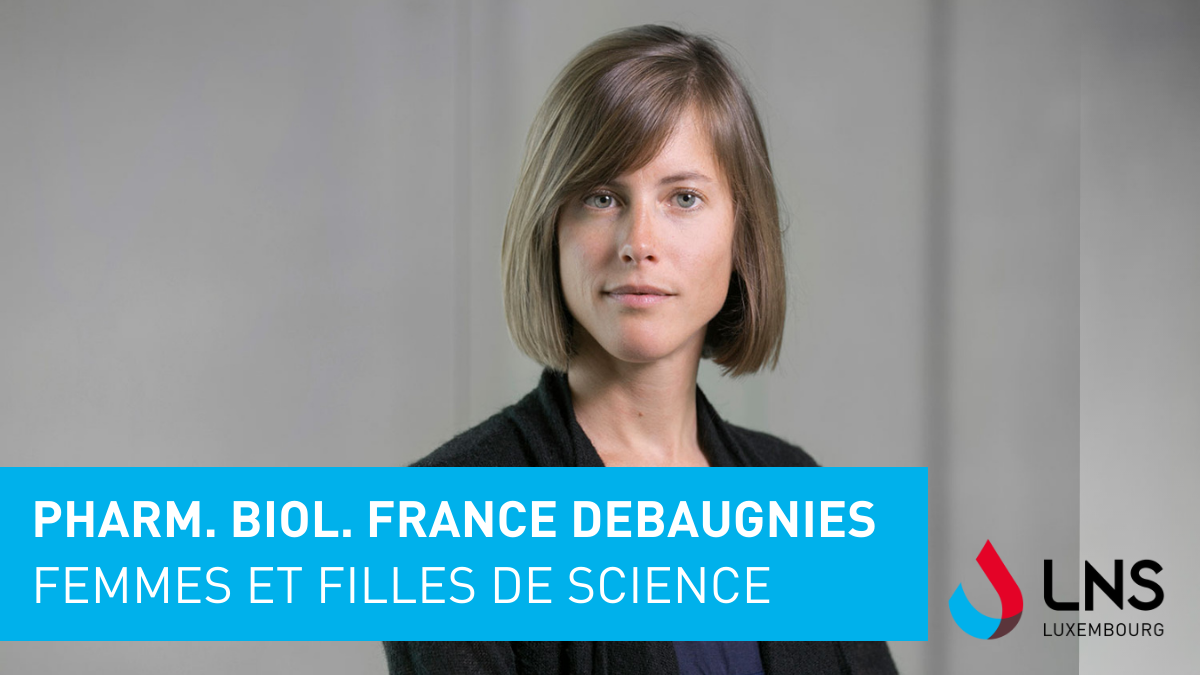- The Laboratory
- Organization
- Departments
- Jobs
- Analysis book
- Contact
- News
- Publications
- Download



Within the framework of the International Day of Women and Girls in Science, we have the pleasure to present you representatives of this female excellence at the LNS, who give us an insight into their work in the following three interviews, telling us what is particularly important to them in their field and how they see the role of women in science. Here the profile of Pharm. Biol. France Debaugnies has been working as a medical biologist in the Laboratoire national de santé’s Medical Biology Department since 2015.
I joined the LNS’ Medical Biology Department in 2015 as a medical biologist. I originally trained at the Brussels University Hospital Laboratory LHUB-ULB (one of the largest university hospital laboratories in Europe). The experience that I gained in this lab whet my appetite for translational research and made me realise how much more expertise could be gained by centralising specialised analyses.
Afterwards, I arrived in Luxembourg to join my family. The position at the LNS was a great opportunity, given the central role it plays. We collaborate with all the laboratories in Luxembourg (hospital and private) to offer them a wide range of specialised analyses in the fields of toxicology, hormonology, metabolic diseases and allergology. We are also responsible for the neonatal screening programme in collaboration with the Ministry of Health.
The role of the biologist in the laboratory is to ensure the quality of the results of the medical analyses while assisting the clinicians in the choice of the tests they prescribe and the interpretation of the results. The Medical Biology Department is staffed by three medical biologists who supervise a dynamic team of 21 technicians, each of whom works in the various units of the department. Developing new tests according to the requests of our various partners is also part of our work.
The quality of the services we provide to our patients and prescribers is our primary concern day in day out. I particularly like this field because it is everchanging, and is a domain where teamwork is the key to continuous improvement. It is also very stimulating because we have state-of-the-art equipment at our disposal (mass spectrometer) to be able to offer new diagnostic tools to our various partners. One of our future projects that is of particular importance to us is the extension of the neonatal screening programme to screen for a greater number of inborn metabolic defects, in order to be in line with our European neighbours. This programme is supported by the Ministry of Health and supervised by the working groups of the National Plan for Rare Diseases (Plan National Maladies Rares – PNMR). All babies born in Luxembourg will be screened in the framework of this programme, which is designed to detect rare and potentially very serious diseases. Early screening allows for the implementation of appropriate treatment before the onset of symptoms and to reduce their negative consequences on the development of babies. For the moment, systematic screening involves the following 5 diseases: phenylketonuria, congenital hypothyroidism, congenital adrenal hyperplasia, MCAD deficiency and mucoviscidosis.
For me, the medical laboratories I have worked in have always been predominantly female environments. So, I would say that women play a dominant role. Of course, there are always differences for those who decide to become mothers, and this can put the brakes on their career development. Having said that, Luxembourg offers a lot of possibilities for young mothers, and scientists in this case, to allow them to flourish in these two roles, such as the different options for parental leave and breastfeeding time.
I do want to put the spotlight on women in science. I would say that qualities such as their curiosity, self-questioning and multi-tasking characterise them as women scientists. This latter quality has been particularly in demand since the beginning of the Covid-19 pandemic in order to maintain the continuity of the laboratories’ activity and to meet the daily organisational challenges caused by the upheaval of the crisis. And this is definitely an asset in the scientific field.